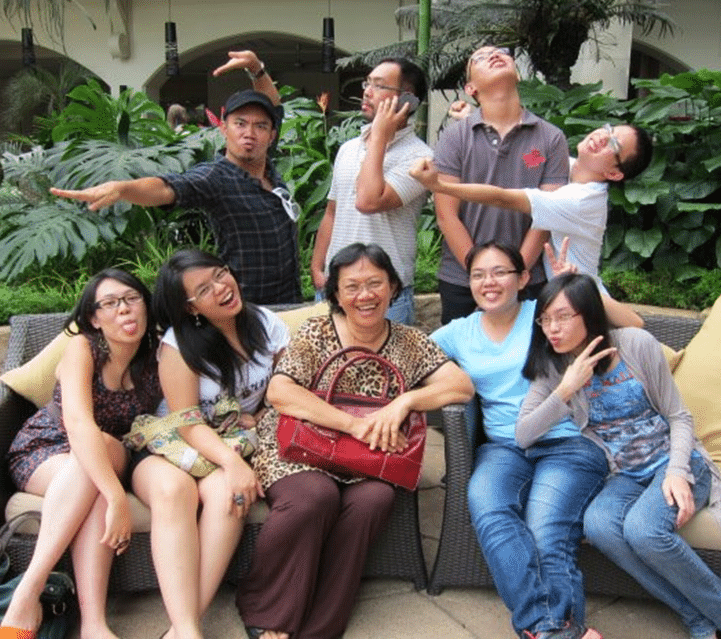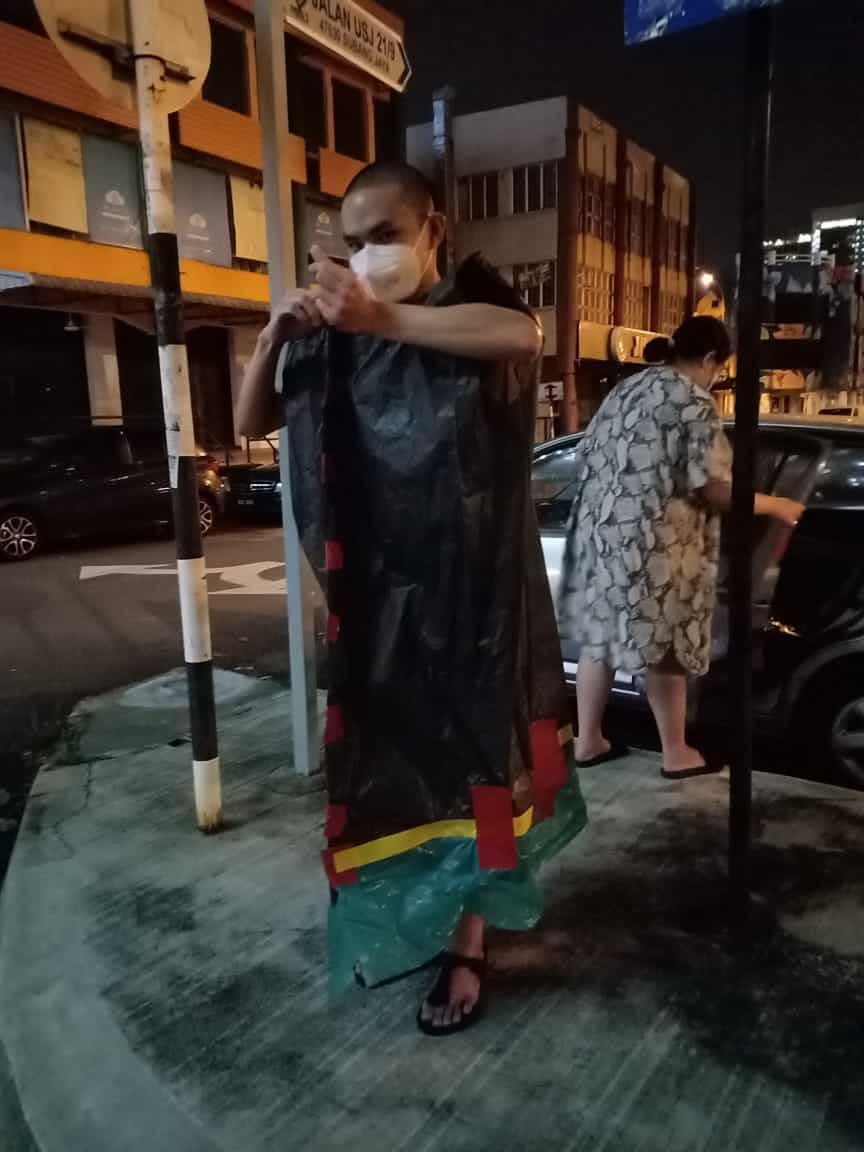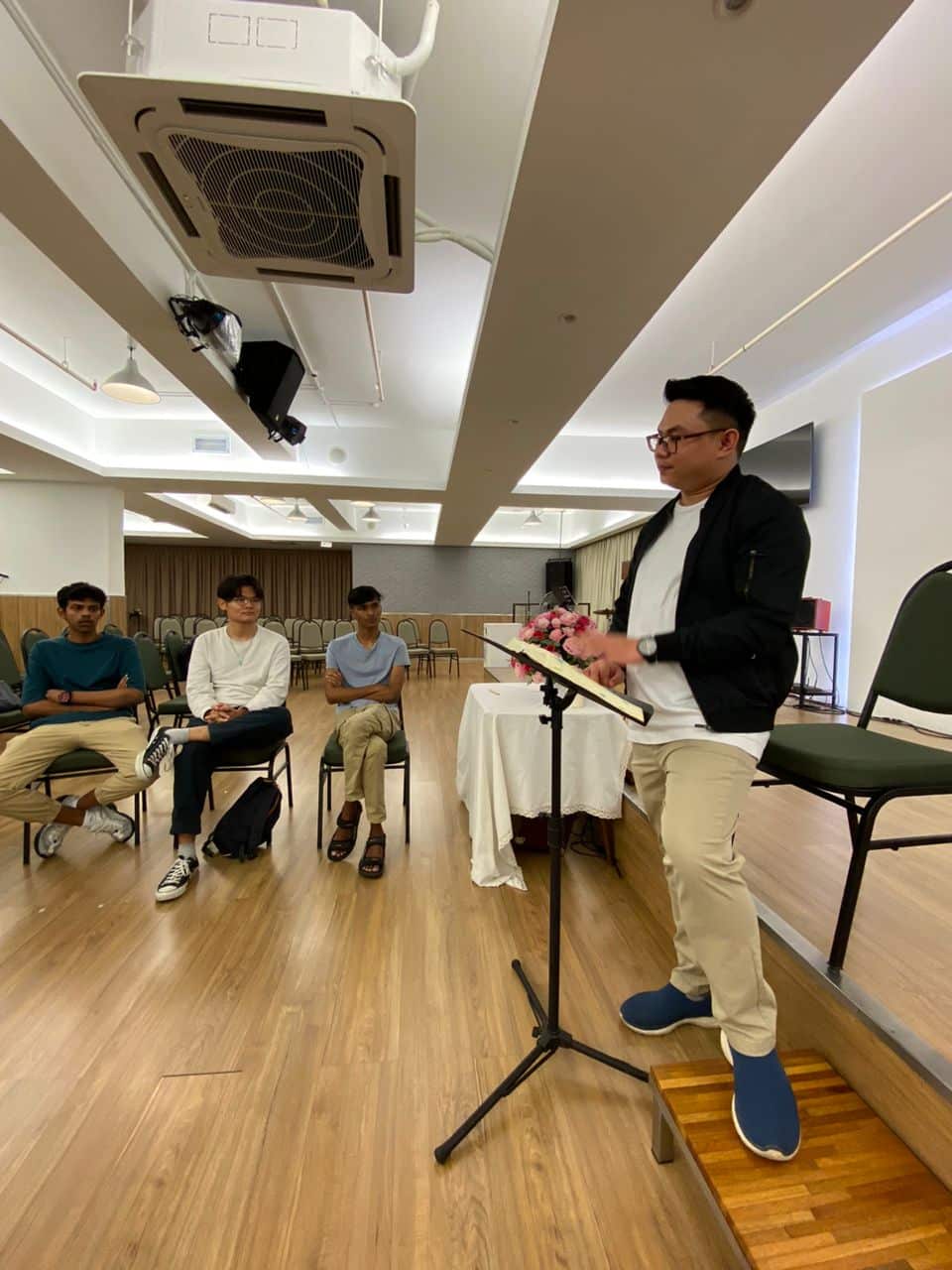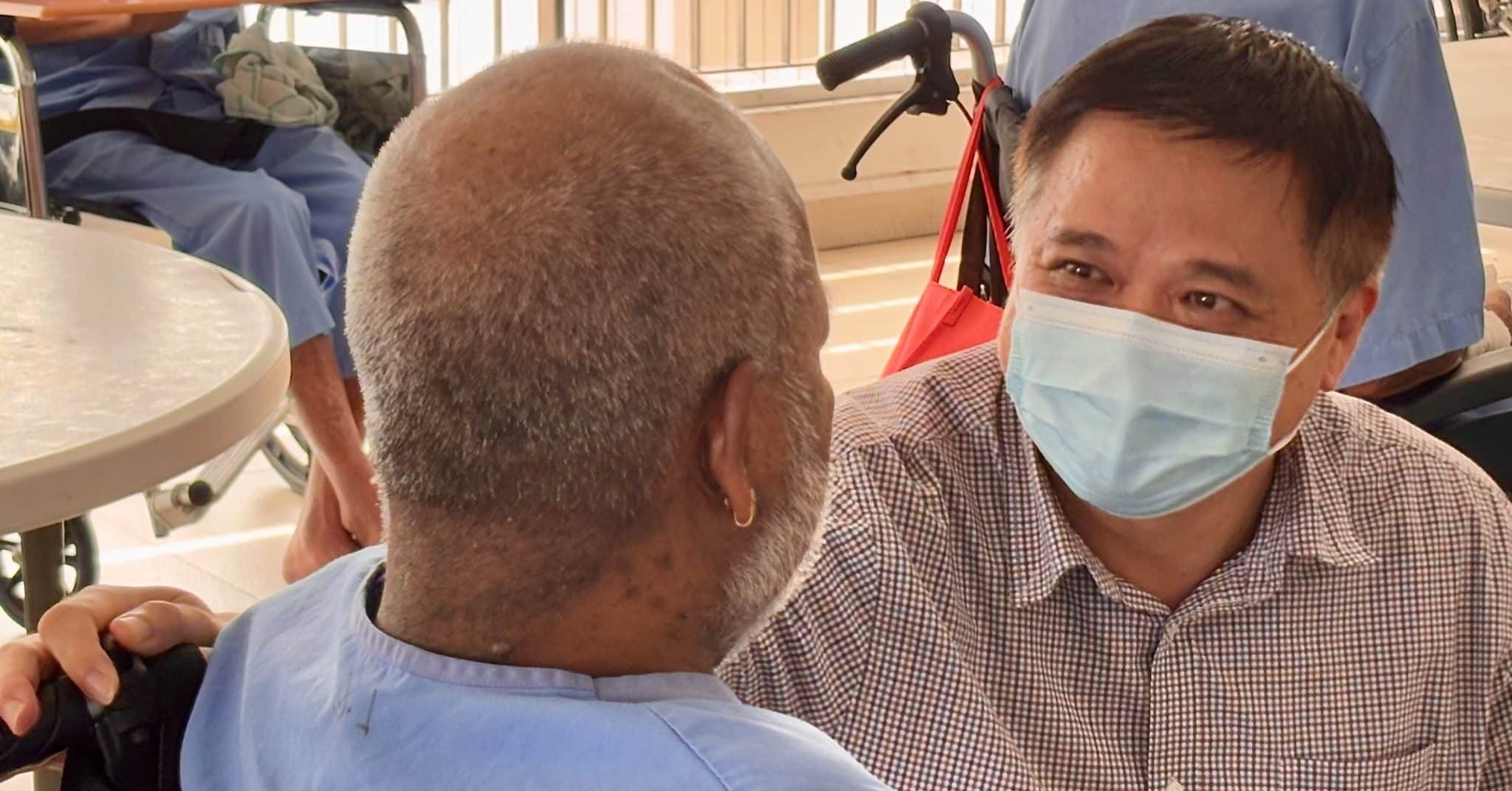“We don’t need to save ourselves”: His struggle with depression, anxiety and OCD helps him to point others to true hope
September 10 is World Suicide Prevention Day. Salt&Light spotlights those who bring help and the hope of Jesus to individuals at risk.
Michelle Chun // September 9, 2024, 4:01 pm

Mental health advocate Luke G Tan, 26, hopes to use his experiences and faith to encourage those struggling with mental health to turn to Christ. All photos courtesy of Luke G Tan.
TRIGGER WARNING: This article mentions suicide ideation and attempts. Reader discretion is advised.
When Luke G Tan was seven years old, he attempted to take his own life.
“We were a big family. Everyone was always arguing about money. I was so tired (of it all).
“‘This is the right thing to do, one mouth less to feed, my sister can have better clothes.’ That’s what ran through my mind,” said the Malaysian, now 26.
That evening, the young boy climbed onto the windowsill on the fourth floor of a shoplot.
“It’s going to be okay. I’ll take care of you. Go back inside.”
As he was about to jump, his older sister walked in and coaxed him off the ledge with the promise of his favourite sweets.
His second suicide attempt was when his sister was not home. This time, a Voice spoke to him as he was perched on the ledge.
“It’s going to be okay. I’ll take care of you. Go back inside.”
Luke didn’t understand Who it was at the time, but he obeyed.
A challenging childhood
The youngest of nine children, Luke was born into a family struggling to survive.
His father, a banker and stock trader, had lost everything when the 1998 Asian financial crisis hit.
“At six years old, I started working in my mother’s cafe. I served tables, made drinks, was the clean-up crew,” he remembered.

Through the ups and downs of life, Luke’s siblings have been a pillar of support to him.
He skipped primary school and was homeschooled in his teenage years.
Though he was born into a Christian family, Luke only discovered God at 15 when he first entered college.
It was a pivotal season that revealed God’s unique calling upon his life.
His unique calling
Back in 2014, mental health was not widely discussed.
At the time, his college did not have a therapist and there were few resources on mental health.
“I realised I was in a space where people needed help, but no one really knew how to help them,” he said. “I had a friend who was self-harming, and in praying for her God impressed upon me not to focus on my studies but to share God’s love with others first.”

In his college years, God impressed upon Luke not to focus on his studies but support his peers with mental health struggles.
Luke quickly qualified that this path was unusual. He only obeyed because he felt it was from God.
So, he determined to be a friendly face and always introduced himself as someone who would not judge.
“There were friends who were depressed or anxious. Coursemates would call me at 2am, having panic attacks. Sometimes, I’d get calls from ones contemplating suicide,” he said.
“Coursemates would call me at 2am, having panic attacks. Sometimes, I’d get calls from ones contemplating suicide.”
He read up voraciously on mental health, creating PDFs, booklets and guides to help fellow students navigate their struggles.
Luke also started a small group at his hostel. It served as a safe space for growth, especially for students from out of town.
As a result of shifting his focus, Luke failed his course. But he was at peace. “As long as You take care of me, I’ll go,” was his prayer.
In the two years at the college, he interacted with about 80 students, supporting them in their mental health and Christian walk.
Eventually, he enrolled in another institution where he completed his degree in biotech.
However, it was in this season that his personal struggle with mental health began.
Finding Jesus in the pits
While in university, Luke began having severe abdominal pain, which added to a host of stressors at home and in school.
After no treatment worked, a psychiatrist diagnosed him with generalised anxiety disorder (GAD) and masked depression.
Masked depression is when the symptoms of depression show up in a variety of somatic or behavioural problems.
“Upon hearing that diagnosis, I crumbled. My hands were always shaking, my heart racing. I could not sleep or eat,” he remembers.
“At its worst, I would pour bleach on my hands and clean for 16-22 hours straight.”
In two months, Luke lost 11kg.
It was only when he started cognitive behavioural therapy, incorporating faith elements such as prayerful meditation, gratitude journaling from a Christian perspective and mindfulness of spiritual realities that he began to improve.
Then, he discovered he had appendicitis. Despite removing his appendix, the abdominal pains remained.
As no medical explanation for his pain could be found, he believed he was carrying bacteria on his body.
Thinking that he needed to keep his family safe, Luke developed obsessive cleaning rituals.
“It started with five minutes and soap, then moved to bleach, alcohol wipes, every cleaning agent. At its worst, I would pour bleach on my hands and clean for 16 to 22 hours straight, stuck in the bathroom from sunrise to sunset,” he said.

When he was struggling with OCD, Luke would wear full plastic gowns made of trash bags taped together to prevent his “germs” from spreading as he walked from his apartment to the car.
Exhausted and depressed, he called his family together and said he wanted to end his life.
But his mother pointed him back to Jesus.
“She told me how much Jesus loved me. It sounds simple, but it’s a very powerful (statement),” he said.
He was also reminded of the words that had been spoken over his life before.
“I had received two similar prophecies from visiting preachers: One when I was still in my mother’s womb and another after I was born. The word was that I would be a great man of God and the harvest,” he shared.
With the assurance that God’s hand was upon him, Luke slowly emerged from the season of darkness.
Journeying with the forgotten
Now that he has had some lived experience, the young man believes he is called to journey with the forgotten and talk about the neglected.
“I see people broken by their past and anxious about their future. When you look at the Gospel, you see what it can bring to a person’s soul,” he shared. “Jesus can set them free.”
“When you look at the Gospel, you see what it can bring to a person’s soul,” he shared. “Jesus can set them free.”
The Gospel is not merely a free ticket to heaven, but true good news for our past, present and future, he added.
“Our past is not fixed in place as a sad and sorry ending. We are liberated to choose. We can choose to break cycles of addiction, pain and unhealthy habits. It’s similar to secular therapy, but the Christian is liberated to a greater, deeper cause and purpose,” he elaborated.
With changed hearts, we can then choose healthy alternatives to revenge or bitterness.
“Ultimately, the Gospel gives us hope that we don’t need to save ourselves, because Jesus saved us,” he said.

Today, Luke (right) works as a tutor. In his free time, he raises awareness on mental health at universities, Christian fellowships and other faith communities.
Nevertheless, apart from leaning onto the hope found in the Gospel, Luke still encourages people struggling with their mental health to seek the right medication, therapy and coping strategies.
“These tools are useful because it provides a glimpse into the true and ultimate reconciliation the Gospel brings, moving us forward in understanding and appreciating this truth,” he said.
“I hope the Church will be bolder and more willing to journey with those suffering.”
Today, he works as a private tutor and spends the rest of his time walking with people facing mental health struggles or life burdens.
He speaks at colleges, universities, Christian fellowships and faith communities, and also raises awareness of mental health through his podcast and social media platform, A Pocketful of Grace.
Asked what he hopes his work will accomplish, he responded: “I hope people can see that God uses ordinary means – therapy, medical procedures etc – to allow us to taste His goodness and glory in this life as we await the life to come.”
Secondly, his prayer is for people to see that the Bible is full of satisfying and helpful truths that can be found if one digs deep prayerfully.
“Finally, I hope the Church will be bolder and more willing to journey with those suffering,” he said.
Confident of his calling
With no desire to climb the corporate (or ministry) ladder, Luke’s chosen path in life has raised many eyebrows, especially in an Asian context. However, he remains confident of his calling.
“Many young Malaysians are struggling with self-worth and hopelessness. There’s so much anxiety about life. They want to know, ‘Is this person right for me?’ or ‘How do I begin adulting?’,” he described.
“My hope is to walk with them in their faith journey.”
Luke also desires to help the Malaysian Church be better equipped to serve those struggling with mental health, so that they can discover the freedom found in full surrender to the lordship of Jesus.
“I know my story doesn’t end in this life. There’s a new life, body and future waiting for me in Christ.”
When we focus too much on ourselves and our suffering, we can end up overwhelmed, Luke pointed out. At times, this can lead to more mental health issues.
“Many of us are afraid of denying ourselves, but when Christ came to do what He did and give us the life that we could never have otherwise, it was for freedom. Denying ourselves is a freeing thing,” he said.
While Luke still struggles with anxiety and obsessive cleaning habits, he relies on God’s grace daily and knows that his life is more than his mental health issues.
“The knowledge that God knew me even before I was born has really shaped my perspective. I am able to see things through the lens that God is using and will use my life,” he said.
He added: “I know God is with me and is as involved in this journey as I am. I also know that my suffering is not meaningless. It will be used by God for good.
“And lastly, I know my story doesn’t end in this life. There’s a new life, body and future waiting for me in Christ. I look forward to that day.”
RELATED STORIES:
Burnt out so many times he lost count, now he helps others build mental resilience
“My pain is deeply known by God”: 4 lessons I learnt through my struggle with anxiety
We are an independent, non-profit organisation that relies on the generosity of our readers, such as yourself, to continue serving the kingdom. Every dollar donated goes directly back into our editorial coverage.
Would you consider partnering with us in our kingdom work by supporting us financially, either as a one-off donation, or a recurring pledge?
Support Salt&Light



